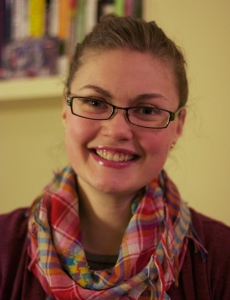Freshly Minted – Kate Petch
May 1, 2014
Media Librarian, Canadian Broadcasting Corporation
 Who are you and what do you do?
Who are you and what do you do?
My name is Kate Petch, and I am a media librarian at the Canadian Broadcasting Corporation. My job involves reference desk duties (for video clips only, not facts – that’s another section of the library), as well as cataloguing programs, news items, and stock footage.
When did you get your MLIS, when did you start your first professional librarian position, how long did the job search take, and how did you prepare yourself for it?
Although I graduated in November 2010 from The University of Toronto’s iSchool, I had finished my coursework in mid-July, and began applying to appealing positions even before that. I’ll admit, I was quite intimidated by most of the postings, and my preparation involved a lot of pep talks, both from myself and from my parents and friends.
My first library job out of school wasn’t actually a full librarian position, but rather a library assistant role, in the tape library at the CBC. I landed that position a few days after my graduation ceremony, and the library assistant job led to my first librarian position nearly a year later, backfilling a librarian in my area when she was seconded off to fill another role.
How did you do your job search? What were some of the things that worked and didn’t? What was the greatest challenge?
My job search was a little haphazard. I networked while I was in school, particularly through library associations, and kept my ears open for any opportunities that way, but mostly only discovered opportunities by staying on top of job boards. I’m not sure if it was just timing, or if I wasn’t networking well. Either way, the greatest challenge was definitely getting an interview. I thought I was pretty good at cover letters, but those depressing numbers they tell you in school about the ratio of applications to interviews certainly proved true for me. That said, I found that demonstrating unbridled enthusiasm in my cover letters opened the most doors, perhaps because it rang truest for me. A cookie cutter cover letter with traditional language missed a lot of what I bring to the job – an enthusiasm and excitement, which translates into a persistent interest in seemingly silly things, like making information findable. (I mean, what’s the use of keeping a great stock shot of people waiting for transit in the snow, if you can’t find it quickly when an editor needs it to illustrate a point?)
Is your work as a professional what you expected and prepared yourself for while you were in the MLIS program? Otherwise, what would you have done differently if you knew?
My work is both exactly what I expected, and light years away. It’s all about the interpretation of the principles I learned in library school. For instance, my cataloguing class didn’t deal with how to shotlist a news item, nor familiarize me with many of the terms I use every day at work, but it did cover how to decide which topics are central to a given news item, and which are incidental, as well as subject headings and taxonomies and their application.
Any advice for the many MLIS students who will be soon graduating and looking for their first professional position?
Make sure you inject a little of yourself in your cover letter. Sure, it would be an honour to work for a given company, but if the idea of it is thrilling, than say it’s thrilling! And stay positive, and patient – your first, second, or even third jobs may not be what you hoped for, but there is always, always, always something to be learned in any position, whether it is understanding the larger environment and workflows of the place that you find yourself employed, or how to train your brain to do something innocuous in a new or more efficient way. If you keep in mind what you’re gaining, and how you can apply any new skills or understandings to getting closer to your goal job, suddenly your less-than-thrilling role has value, and value that you can articulate.
Add a new comment